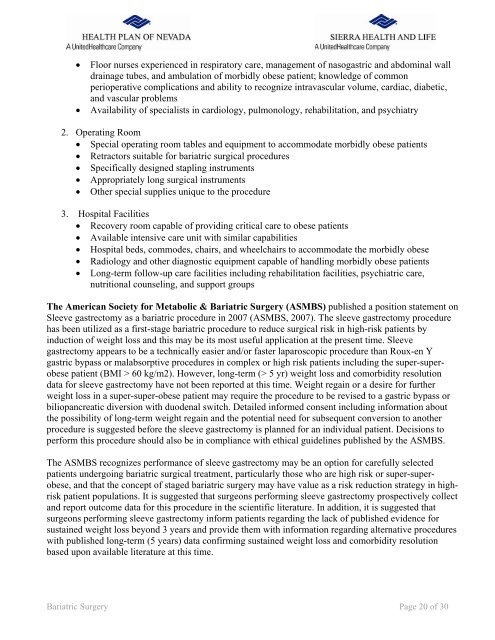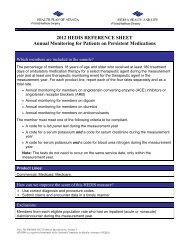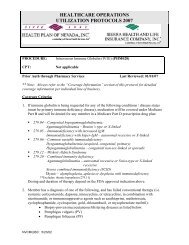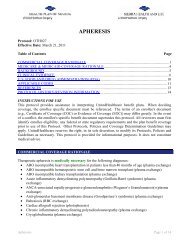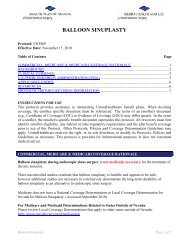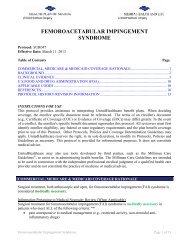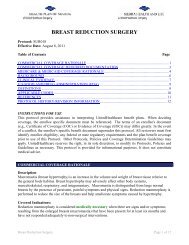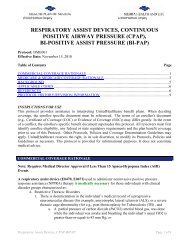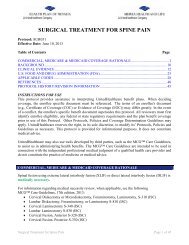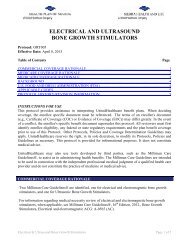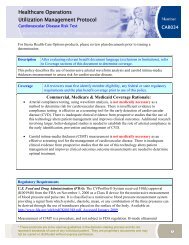BARIATRIC SURGERY - Health Plan of Nevada
BARIATRIC SURGERY - Health Plan of Nevada
BARIATRIC SURGERY - Health Plan of Nevada
Create successful ePaper yourself
Turn your PDF publications into a flip-book with our unique Google optimized e-Paper software.
WOU001<br />
• Floor nurses experienced in respiratory care, management <strong>of</strong> nasogastric and abdominal wall<br />
drainage tubes, and ambulation <strong>of</strong> morbidly obese patient; knowledge <strong>of</strong> common<br />
perioperative complications and ability to recognize intravascular volume, cardiac, diabetic,<br />
and vascular problems<br />
• Availability <strong>of</strong> specialists in cardiology, pulmonology, rehabilitation, and psychiatry<br />
2. Operating Room<br />
• Special operating room tables and equipment to accommodate morbidly obese patients<br />
• Retractors suitable for bariatric surgical procedures<br />
• Specifically designed stapling instruments<br />
• Appropriately long surgical instruments<br />
• Other special supplies unique to the procedure<br />
3. Hospital Facilities<br />
• Recovery room capable <strong>of</strong> providing critical care to obese patients<br />
• Available intensive care unit with similar capabilities<br />
• Hospital beds, commodes, chairs, and wheelchairs to accommodate the morbidly obese<br />
• Radiology and other diagnostic equipment capable <strong>of</strong> handling morbidly obese patients<br />
• Long-term follow-up care facilities including rehabilitation facilities, psychiatric care,<br />
nutritional counseling, and support groups<br />
The American Society for Metabolic & Bariatric Surgery (ASMBS) published a position statement on<br />
Sleeve gastrectomy as a bariatric procedure in 2007 (ASMBS, 2007). The sleeve gastrectomy procedure<br />
has been utilized as a first-stage bariatric procedure to reduce surgical risk in high-risk patients by<br />
induction <strong>of</strong> weight loss and this may be its most useful application at the present time. Sleeve<br />
gastrectomy appears to be a technically easier and/or faster laparoscopic procedure than Roux-en Y<br />
gastric bypass or malabsorptive procedures in complex or high risk patients including the super-superobese<br />
patient (BMI > 60 kg/m2). However, long-term (> 5 yr) weight loss and comorbidity resolution<br />
data for sleeve gastrectomy have not been reported at this time. Weight regain or a desire for further<br />
weight loss in a super-super-obese patient may require the procedure to be revised to a gastric bypass or<br />
biliopancreatic diversion with duodenal switch. Detailed informed consent including information about<br />
the possibility <strong>of</strong> long-term weight regain and the potential need for subsequent conversion to another<br />
procedure is suggested before the sleeve gastrectomy is planned for an individual patient. Decisions to<br />
perform this procedure should also be in compliance with ethical guidelines published by the ASMBS.<br />
The ASMBS recognizes performance <strong>of</strong> sleeve gastrectomy may be an option for carefully selected<br />
patients undergoing bariatric surgical treatment, particularly those who are high risk or super-superobese,<br />
and that the concept <strong>of</strong> staged bariatric surgery may have value as a risk reduction strategy in highrisk<br />
patient populations. It is suggested that surgeons performing sleeve gastrectomy prospectively collect<br />
and report outcome data for this procedure in the scientific literature. In addition, it is suggested that<br />
surgeons performing sleeve gastrectomy inform patients regarding the lack <strong>of</strong> published evidence for<br />
sustained weight loss beyond 3 years and provide them with information regarding alternative procedures<br />
with published long-term (5 years) data confirming sustained weight loss and comorbidity resolution<br />
based upon available literature at this time.<br />
Bariatric Surgery Page 20 <strong>of</strong> 30


